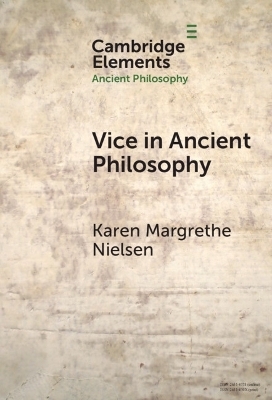
Vice in Ancient Philosophy
Plato and Aristotle on Moral Ignorance and Corruption of Character
Seiten
2024
Cambridge University Press (Verlag)
978-1-009-46803-9 (ISBN)
Cambridge University Press (Verlag)
978-1-009-46803-9 (ISBN)
This Element considers injustice and lawlessness in Plato and Aristotle. Starting with Socrates' paradoxical claim that 'tyrants and orators do just about nothing they want to do'. It yields new insights into ancient Greek ethics and moral psychology, as well as surprising perspectives on contemporary debates.
Ancient philosophers offer intriguing accounts of vice – virtue's bad twin. This Element considers injustice and lawlessness in Plato and Aristotle. Starting with Socrates' paradoxical claim that 'tyrants and orators do just about nothing they want to do' (Gorgias 466d-e), it examines discussions of moral ignorance and corruption of character in Plato's Republic and Aristotle's Nicomachean Ethics. Aristotle's account of vice is indebted to Plato's. But his claims have confounded critics. Why is the vicious agent full of regrets when he acts in accordance with his wish? To what extent is vice a form of moral ignorance? Why will the unjust man never get what he wants? These and other questions yield new insights into ancient Greek ethics and moral psychology, as well as surprising perspectives on contemporary debates.
Ancient philosophers offer intriguing accounts of vice – virtue's bad twin. This Element considers injustice and lawlessness in Plato and Aristotle. Starting with Socrates' paradoxical claim that 'tyrants and orators do just about nothing they want to do' (Gorgias 466d-e), it examines discussions of moral ignorance and corruption of character in Plato's Republic and Aristotle's Nicomachean Ethics. Aristotle's account of vice is indebted to Plato's. But his claims have confounded critics. Why is the vicious agent full of regrets when he acts in accordance with his wish? To what extent is vice a form of moral ignorance? Why will the unjust man never get what he wants? These and other questions yield new insights into ancient Greek ethics and moral psychology, as well as surprising perspectives on contemporary debates.
1. Desire and great power in the Gorgias; 2. The Tyrant's vice in the republic; 3. Vice and moral ignorance in the nicomachean ethics; References.
| Erscheinungsdatum | 17.01.2024 |
|---|---|
| Reihe/Serie | Elements in Ancient Philosophy |
| Zusatzinfo | Worked examples or Exercises |
| Verlagsort | Cambridge |
| Sprache | englisch |
| Maße | 159 x 235 mm |
| Gewicht | 260 g |
| Themenwelt | Geisteswissenschaften ► Philosophie ► Ethik |
| Geisteswissenschaften ► Philosophie ► Philosophie Altertum / Antike | |
| Geisteswissenschaften ► Sprach- / Literaturwissenschaft ► Anglistik / Amerikanistik | |
| Geisteswissenschaften ► Sprach- / Literaturwissenschaft ► Literaturwissenschaft | |
| ISBN-10 | 1-009-46803-0 / 1009468030 |
| ISBN-13 | 978-1-009-46803-9 / 9781009468039 |
| Zustand | Neuware |
| Informationen gemäß Produktsicherheitsverordnung (GPSR) | |
| Haben Sie eine Frage zum Produkt? |
Mehr entdecken
aus dem Bereich
aus dem Bereich


